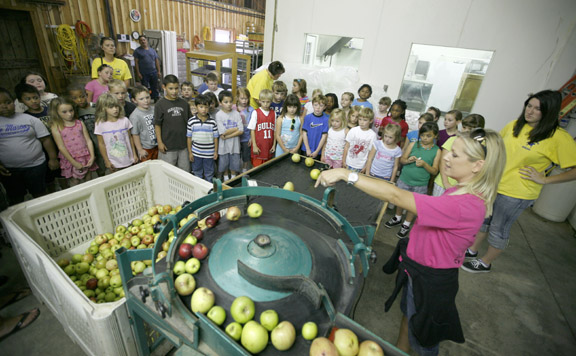
Evan’s Orchard employee Leigh Ayres demonstrates the apple sorter for students from Anne Mason Elementary School (Scott County) Sept. 22, 2010. Photo by Amy Wallot
By Susan Riddell
susan.riddell@education.ky.gov
As they took bites of different apples, 2nd-grade students at Anne Mason Elementary School (Scott County) kicked off a science unit without even realizing it.
On a field trip to nearby Evan’s Orchard, the youngsters performed a taste test of three apples to see which one was the class favorite. The trip was put together by the Kentucky Department of Agriculture’s Farm to School program, which is geared toward providing local, healthy and nutritious fruits and vegetables to school children, as well as helping local producers.
Among the roughly 120 students, around 65 percent of them said they prefer the Jonagold apple over the Golden Delicious and Rome varieties. So did teacher Courtney Baird, who said the rest of the field trip – consisting of a hayride through the orchard, learning how cider is made and what products are made from apples – prepared them for new lessons.
“Our life science unit began the Monday after our trip,” Baird said. “The trip to the orchard served as a hands-on learning experience that helped paint very real examples for their learning.
“Our children have been studying living and nonliving things in science,” Baird added. “They are required to know the basic needs of living things as well as developing an understanding that living things grow and change. The children were able to see on our trip how an apple tree starts as a seed and as it grows, changes into a tree. This was a great introduction to life cycles of plants. They also will study nutrition throughout the year in physical education class. They will learn about making healthy food choices and how to classify foods into appropriate food groups.”
While Farm to School is in the early stages of trying to reach the classroom, it is well-involved in the many school cafeterias throughout the state.
Sylvia Moore has been the food services coordinator in Mercer County for 21 years. She said she has always wanted to participate in a program like Farm to School, but had concerns about liability and procurement.
“Our food service department has collaborated with the University of Kentucky in doing on-site research about how to increase the intake of fresh produce for years,” Moore said. “We have learned many interesting things from being involved with them. Other research indicated that students increased their intake if the products were locally grown. There was a sense of community pride as well as helping the local farmers and local economy.
“Of course, the produce was also usually tastier and healthier since it was fresher due to being delivered locally,” Moore added. “It is significant to realize how many miles and how much time it actually takes to get produce to us via the regular routes.”
Tina Garland, coordinator for Farm to School, said the future of the program is very bright, especially when school districts like Mercer County are able to thrive so much by using it.
“I believe that our Kentucky producers can feed our Kentucky schools,” Garland said. “That’s what I hope for in terms of the future of the Farm to School program.
“Impact in the classroom can be huge,” Garland added, “because agriculture can be used in every subject. It impacts so much of our lives.”
Mayfield Independent school district Food Service Director Karen Falder said her district is involved in the Farm to School program on a limited basis due to a lack of participating farmers in Mayfield’s western Kentucky region.
“The local farmer we do have supplies us with hydroponic leaf lettuces, tomatoes and cucumbers year-round,” Falder said. “That gives us quality, steady price and steady availability. The varieties offered also provide more nutrition because they are of the dark green leafy variety.”
Falder said getting the foods is easy.
“We place our order on Monday and, because they are local (within 30 miles), it is harvested and delivered within a couple hours,” Falder said. “Talk about fresh … and I encourage my managers to order the varieties that students will enjoy eating. If they offer something students aren’t accustomed to, I encourage them to offer samples to improve acceptability. Students really like the fresh colorful salads we offer using (local) Hydro Farms products.”
While most schools in the program use neighboring farms to supply food, Mercer County recently started growing its own food, getting assistance from the high school’s agriculture department and FFA.
“The students can see there is a need locally for agriculture products, and they may be able to find markets they had never considered before,” Moore said. “And the local agriculture staff and FFA directors can realize a different market for their students.
“Students can take pride in their accomplishments locally and even on-site with their peers and staff,” Moore added. “They can actually see and ‘taste’ the fruit of their labor at lunch time. Other students can see, taste and feel a more personal connection with the foods they choose. I think we sold more tomato products in tomato-stuffed salads and the salad bar because the quality was better and because others wanted to support their efforts.”
Mercer County High School agriculture teacher Dan Stolzfus said improved learning and health make students’ and teachers’ extra work worth the effort.
“Ag teachers are promoting healthier eating in the classroom and teaching gardening tips for the horticulture students,” he said. “They are also using greenhouses during the off-season for raising bedding plants to produce tomatoes for the school.
“The learning experiences for students include growing the plants from seed to production, management practices, organic gardening and the use of safe chemical, harvesting, packaging and selling fresh tomatoes. The alternative crops grow in greenhouses during the winter.”
Kendra Horn, who teaches Introduction to Agriculture at Mercer County Ninth Grade Academy, likes that she can use Farm to School to bring experiential learning into her classroom.
“Food science is becoming more popular in agricultural education, and it is a great way to educate youth on where our food comes from,” Horn said. “The agriculture classes also have collaborated with science classes so that more students are involved.”
Mercer County staff members involved with the Farm to School program are presenting their work with Farm to School on a state and national level. Last month, Moore spoke at a national conference in Kansas City.
Farm to School “has been a great way to show how student groups of different interests and backgrounds can collaborate to make positive changes for both,” Moore said. “Hopefully, we’ve taught them a good life lesson that they do have a voice as individuals, and that when they get together with like-minded people, they have a more significant ‘voice.’”
MORE INFO …
Tina Garland, tina.garland@ky.gov, (502) 573-0282









Leave A Comment